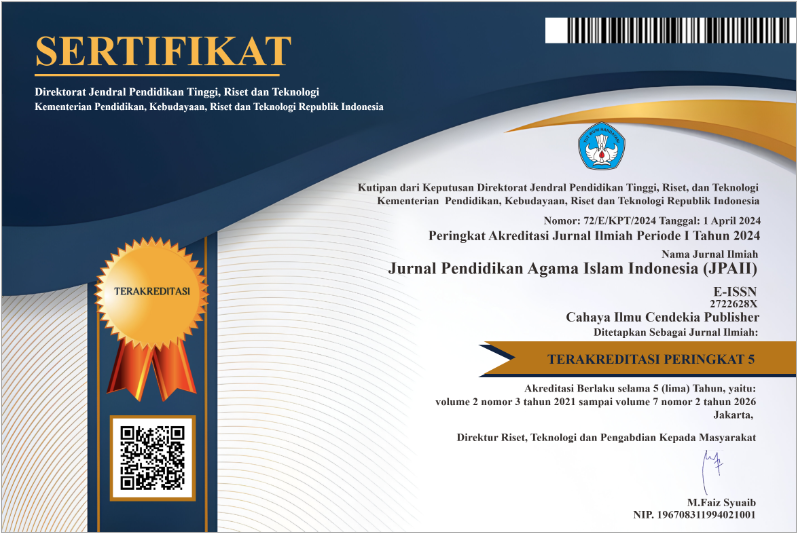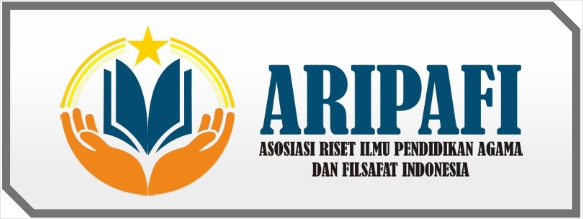Case Study of Islamic Religious: The Influence of Islamic Religious Guidance on the Practice of Prayer at Madrasah
Abstract
Purpose of the study: This research aims to determine the influence of Islamic religious formation on the prayer practice of madrasah children. Islamic religious formation in children has a big positive impact on the practice of prayer.
Methodology: This research is a type of quantitative research. carry out research by distributing questionnaires and rating scales, because in this case the observations use a rating scale. Respondents numbered 30 madrasah children. Then, to obtain data about the development of the Islamic religion and the implementation of prayer services by children, a questionnaire and rating scale were used.
Main Findings: Islamic religious formation has a significant influence on the practice of prayer. Through these coaching efforts, individuals gain a deep understanding of Islamic teachings, including the procedures for performing prayers. Religious formation can strengthen spiritual beliefs and awareness, motivating individuals to perform prayer services consistently. Understanding of the meaning and purpose of prayer can also be improved through religious formation, so that individuals feel a closer connection with Allah in every prayer movement.
Novelty/Originality of this study: The importance of the development of the Islamic religion in forming the spiritual awareness of the people has a significant positive impact on the intensity and quality of the prayer practice of madrasah children. By focusing on a deep understanding of Islamic teachings, this training is the main key in forming individuals who are devout and devout in worship.
References
M. L. Baehaqi and M. Murdiono, “Strengthening Discipline Character of Students at Muhammadiyah Boarding-School (MBS) Muhiba Yogyakarta,” Din. Ilmu, vol. 20, no. 1, pp. 63–82, 2020, doi: 10.21093/di.v20i1.1671.
M. Bahnasi, Shalat sebagai terapi psikologi. Bandung: Mizania, 2004.
Y. R. Uyuni, “Konsep pola asuh orang tua dalam perspektif islam terhadap tumbuh kembang anak dalam keluarga,” aṣ-ṣibyān J. Pendidik. Anak Usia Din, vol. 4, no. 2, 2019.
F. E. Saputro, “The Role of Islamic Religious Education Teachers in Actualizing Tolerance Attitudes To Students,” AL-ISHLAH J. Pendidik., vol. 12, no. 2, pp. 336–347, 2020, doi: 10.35445/alishlah.v12i2.214.
F. Özkan Yıldız and A. Yılmaz, “Parent-teacher communication and parental expectations in the assessment process in Turkish preschool settings,” Int. J. Primary, Elem. Early Years Educ., vol. 49, no. 6, pp. 761–775, 2021, doi: 10.1080/03004279.2020.1861049.
A. Busra, “Peranan orang tua terhadap pembinaan akhlak anak,” L-WARDAH J. Kaji. Perempuan, Gend. Dan Agama, vol. 12, no. 2, pp. 123–130, 2019.
M. Taufik, “Strategic role of Islamic religious education in strengthening character education in the era of industrial revolution 4.0,” J. Ilm. Islam Futur., vol. 20, no. 1, p. J. Ilm. Islam Futur., 2020.
C. Anwar, A. Saregar, U. Hasanah, and Widayanti, “The Effectiveness of Islamic Religious Education inthe Universities: The Effects on the Students’ Characters in the Era of Industry 4.0,” Tadris J. Kegur. Dan Ilmu Tarb., vol. 3, no. 1, pp. 77–87, 2018, doi: 10.24042/tadris.v3i1.2162.
C. F. Correia and C. Harrison, “Teachers’ beliefs about inquiry-based learning and its impact on formative assessment practice,” Res. Sci. Technol. Educ., vol. 38, no. 3, pp. 355–376, 2020, doi: 10.1080/02635143.2019.1634040.
O. Akinoǧlu and R. Ö. Tandoǧan, “The effects of problem-based active learning in science education on students’ academic achievement, attitude and concept learning,” Eurasia J. Math. Sci. Technol. Educ., vol. 3, no. 1, pp. 71–81, 2007, doi: 10.12973/ejmste/75375.
A. Jiménez et al., “The enabling environment for participation in water and sanitation: A conceptual framework,” Water (Switzerland), vol. 11, no. 2, pp. 1–21, 2019, doi: 10.3390/w11020308.
N. Nurhadi and M. Harahap, “Teacher’s Responsibility in Islamic Education (Relevance of Hamka and Hasan Langgulung Thought),” Palapa, vol. 9, no. 1, pp. 137–181, 2021.
H. Darmadi, “Educational Management Based on Local Wisdom (Descriptive Analytical Studies of Culture of Local Wisdom in West Kalimantan),” JETL (Journal Educ. Teach. Learn., vol. 3, no. 1, p. 135, 2018, doi: 10.26737/jetl.v3i1.603.
A. Basir, A. W. Syakhrani, V. Wirawan, A. Harahap, and G. Widjaja, “Support for Islamic Understanding from Families Information of Piety for The Millennial Generation,” Nazhruna J. Pendidik. Islam, vol. 4, no. 2, pp. 434–446, 2021.
M. J. Susilo, M. H. Dewantoro, and Y. Yuningsih, “Character education trend in Indonesia,” J. Educ. Learn., vol. 16, no. 2, pp. 180–188, 2022, doi: 10.11591/edulearn.v16i2.20411.
Kamid et al., “Comparison and Effect of Persistent Character and Mathematical Process Skills on Fractional Computing Operation Materials in Elementary School,” J. Innov. Educ. Cult. Res., vol. 4, no. 3, pp. 438–449, 2023, doi: 10.46843/jiecr.v4i3.475.
A. M. Kelly, “Social cognitive perspective of gender disparities in undergraduate physics,” Phys. Rev. Phys. Educ. Res., vol. 12, no. 2, pp. 1–13, 2016, doi: 10.1103/PhysRevPhysEducRes.12.020116.
Astalini, Darmaji, D. A. Kurniawan, S. E. Septi, A. M. Nawahdani, and M. Z. Azzahra, Literature Review: Action and Reaction of the Inquiry Learning Model on Students’ Attitudes and Characters Against Physics Learning. Atlantis Press SARL, 2023.
F. K. Azadboni and S. E. Septi, “Differences and Relationships on Self-Efficiency and Discipline Character of High School Students,” EduFisika J. Pendidik. Fis., vol. 8, no. 2, pp. 233–244, 2023, doi: 10.59052/edufisika.v8i2.27704.
J. Edwards and P. R. Hobson, Religious education in a pluralist society: The key philosophical issues. Routledge, 2019.
B. R. Wilcox and H. J. Lewandowski, “A summary of research-based assessment of students’ beliefs about the nature of experimental physics,” Am. J. Phys., vol. 86, no. 3, pp. 212–219, 2018, doi: 10.1119/1.5009241.
R. E. Sulistyaningtyas and P. Y. Fauziah, “The Implementation of Traditional Games for Early Childhood Education,” Adv. Soc. Sci. Educ. Humanit. Res., vol. 326, no. Iccie 2018, pp. 431–435, 2019, doi: 10.2991/iccie-18.2019.75.
J. Sanguiliano, K. Anderson, S. Welcome, P. Hissom, B. Hannah, and N. Lovero, “Strong Families and Successful Students: A Qualitative Study of Families Involved in a Strength-Based Community Program,” J. At-Risk Issues, vol. 22, no. 1, pp. 19–27, 2019.
M. R. M. Nor and M. K. Ibrahim, “From separation between state and religion to religion-freeing state: the changing faces of secularism in Turkey,” Indones. J. Islam Muslim Soc., vol. 13, no. 1, pp. 85–114, 2023, doi: 10.18326/ijims.v13i1.85-114.
Iskandar, Waridin, and D. D. Iskandar, “The potential of Muslim Friendly Hospitality in the tourism industry in Central Java,” Indones. J. Islam Muslim Soc., vol. 13, no. 1, pp. 169–197, 2023, doi: 10.18326/ijims.v13i1.169-197.
P. De Bruyckere and P. A. Kirschner, “Measuring teacher authenticity: Criteria students use in their perception of teacher authenticity,” Cogent Educ., vol. 4, no. 1, 2017, doi: 10.1080/2331186X.2017.1354573.
Q. Li, X. Tan, and L. Wang, “Testing for error correlation in partially functional linear regression models,” Commun. Stat. - Theory Methods, vol. 50, no. 3, pp. 747–761, 2021, doi: 10.1080/03610926.2019.1642492.
B. Anoraga, “Crowdfunding for Inter-Faith Peace: Youth, Networked Social Movement, and Muslim Philanthropy NGOs in Contemporary Indonesia,” Indones. J. Islam Muslim Soc., vol. 13, no. 2, pp. 307–338, 2023, doi: 10.18326/ijims.v13i2.307-338.
A. Maksum, H. Jubba, I. Abdullah, E. N. Wahyuni, and A. R. Sopyan, “Redefining the islamic defenders front’s (FPI) identity after its dissolution by the indonesian government,” Indones. J. Islam Muslim Soc., vol. 13, no. 2, pp. 399–426, 2023, doi: 10.18326/ijims.v13i2.399-426.
M. Taufik, “Strategic role of Islamic religious education in strengthening character education in the era of industrial revolution 4.0,” J. Ilm. Islam Futur., vol. 20, no. 1, pp. 86–104, 2020.
M. N. Kohar and A. Majid, “The Role of Islamic Religious Education Teachers in Spreading the Ideology of Islamic Moderation,” J. Soc. Res., vol. 2, no. 12, pp. 5012–5021, 2023, doi: 10.55324/josr.v2i12.1604.
F. Ulfat, “Empirical research: Challenges and impulses for Islamic religious education,” Br. J. Relig. Educ., vol. 42, no. 4, pp. 415–423, 2020, doi: 10.1080/01416200.2020.1711513.
Copyright (c) 2024 Aji Abidin, Marwa Jassim Mohammed, Hatef Siahkoohian

This work is licensed under a Creative Commons Attribution 4.0 International License.
Authors who publish with this journal agree to the following terms:
- Authors retain copyright and acknowledge that the Jurnal Pendidikan Agama Islam Indonesia (JPAII) is the first publisher licensed under a Creative Commons Attribution 4.0 International License.
- Authors are able to enter into separate, additional contractual arrangements for the non-exclusive distribution of the journal's published version of the work (e.g., post it to an institutional repository or publish it in a book), with an acknowledgment of its initial publication in this journal.
- Authors are permitted and encouraged to post their work online (e.g., in institutional repositories or on their website) prior to and during the submission process, as it can lead to productive exchanges and earlier and greater citation of published work.







.png)
.png)





















